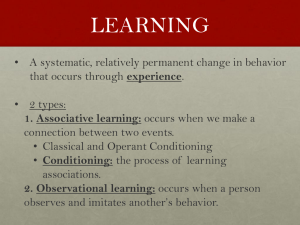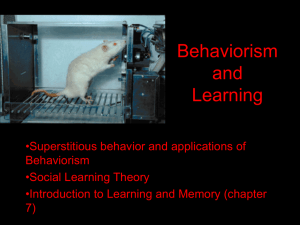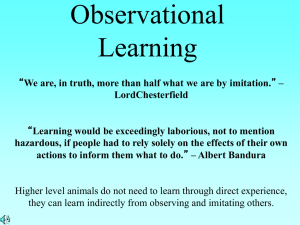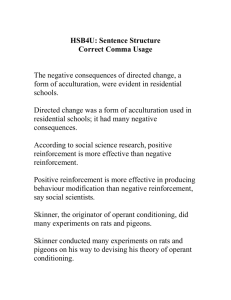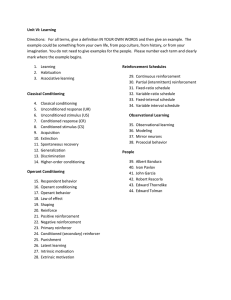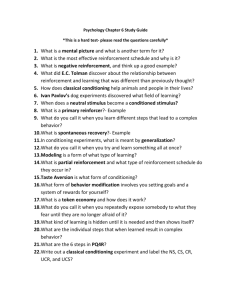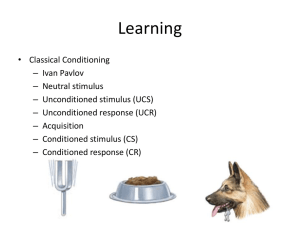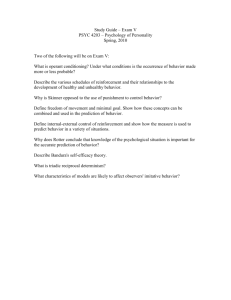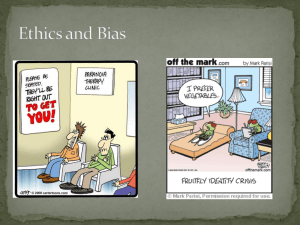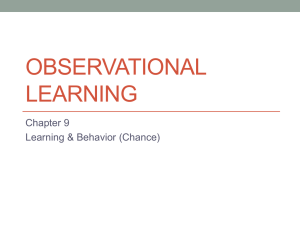Social Learning PowerPoint Notes
advertisement
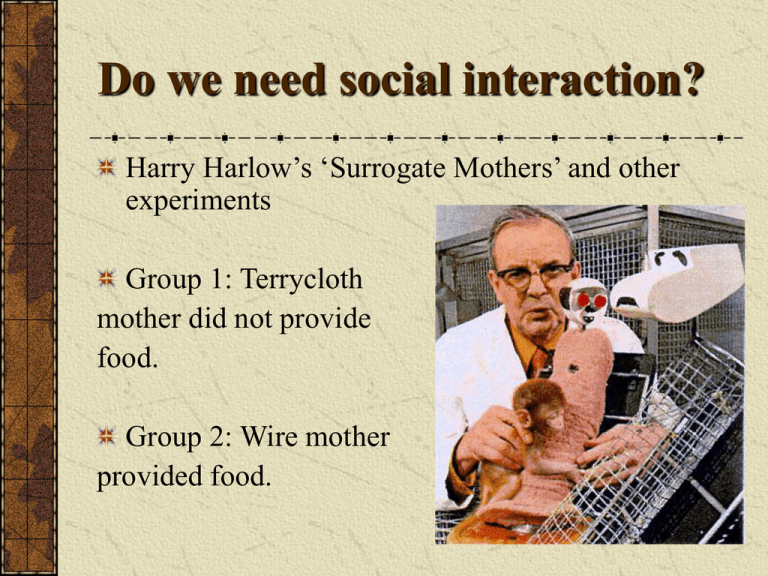
Do we need social interaction? Harry Harlow’s ‘Surrogate Mothers’ and other experiments Group 1: Terrycloth mother did not provide food. Group 2: Wire mother provided food. Isolation Chambers Pit of Despair Isolation of Monkeys Partially and Fully isolated monkeys Partially isolated (occasional social contact) – • Repetitive circling of cages, blank staring, and occasional self mutilation Total social deprivation (6, 12, 24 months) • 6 months = emotional shock when reintroduced: rocking and clenching, rare anorexia • 12, 24 months = “obliterated the monkeys socially” All isolated monkeys exhibited little to no recovery Social Learning Process of altering behavior observing and imitating the behavior of others. Observational Learning and Cognitive Learning “Learning would be exceedingly laborious, not to mention hazardous, if people had to rely solely on the effects of their own actions to inform them what to do.” • Albert Bandura (1977) Observational Learning Observational Learning Learning by observing others. Modeling The process of observing and imitating a specific behavior. Vicarious Reinforcement You first engage in a behavior because you saw someone else get rewarded Directly tied to Operant Conditioning Mirror Neurons Fire both when performing actions and when observing another doing so. NOVA – Mirror Neurons Modeling Follow the Leader: The behavior of others increases the chances that we will do the same thing Clapping, looking out the window, copying the styles and verbal expressions of our peers Observational Learning Watch someone else perform a behavior, then be able to perform the behavior yourself Learning a game, dance move, sport Role Models Role Models Do we chose to be a role model? How important are older siblings? parents? peers? "I don't believe professional athletes should be role models. I believe parents should be role models.... It's not like it was when I was growing up. My mom and my grandmother told me how it was going to be. If I didn't like it, they said, "Don't let the door hit you in the ass on your way out." Parents have to take better control." • Sir Charles Barkley Albert Bandura’s Bobo Doll Experiment Children were exposed to adults displaying aggression toward a bobo doll, and were then observed in a room filled with toys What happened? Bobo Clip The beating of Bobo… TV and Violence Before you turn 18, you will see approx. 18,000 simulated murders on TV & movies Since the 1960s, more than 3,000 studies have linked television violence to real violence Results: viewers become desensitized to violence, become more fearful behave more violently Bandura’s Social-Cognitive Theory Social-Cognitive Theory applies fundamentals of social learning to personality and behavior choices. Social-Cognitive Theory Clip Extinction of Phobias / Disinhibition Learning that seemingly threatening experiences can be safe Phobia treatment (counter-conditioning) Safety of new environment Application of Social Learning Bad news – antisocial models may have antisocial effects on children Good news – prosocial (positive, helpful) models can have prosocial effects Consistency of words and actions. Social learning plays a large role Parents are extremely powerful models Children See, Children Do Latent (Incidental) Learning Learning that occurs without knowledge being immediately expressed Accidental learning that occurs in the process of another behavior • Setting the table, putting in a light bulb Knowledge is there, but does not come out until a reinforcer appears Cognitive Maps E.C. Tolman studied in 1930s Taught rats a maze through repetition, without providing reinforcement (food) Once a reinforcer was presented for completion of the maze, the rats were just as quick to complete as rats which received food upon every completion A mental picture of a place which allows you to navigate to an unseen destination Formation of Insight An insight is a new way to organize stimuli or a new approach to solving a problem Once insight has occurred, no further training is necessary Wolfgang Kohler Chimps with insight Pigeon shows insight Learned Helplessness Condition in which a person gives up due to repeated failure Seligman’s electric shock dog studies Hiroto’s study of college students (1974) People feel they have no control over environment; success seems more a matter of luck than skill Learned Laziness - Condition that occurs if rewards come without effort, a person never learns to work. Martin Seligman on Depression Learned helplessness is a leading cause of depression Stability Temporary vs. Stable Globality Specific vs. Global Internality External vs. Internal Behavior Modification Systematic application of learning principles to change people’s actions and feelings Involves a series of well-defined steps to change behavior. The success of each step is carefully evaluated to find the best solution for a given situation. Common in sports training and drug treatment – involves intense drive to become an ideal product Modeling, classical conditioning, operant conditioning Self Control Changing your own behavior 1. Define the problem specifically This can often lead to a change in behavior 2. Behavioral contract Study Habits Considerations: negative emotions, environment, conditioning Bad Habits How are bad habits formed? Procrastination Favoring immediate reinforcement and accepting delayed punishment Token Economies Desirable behavior is reinforced with valueless objects, which can be accumulated and exchanged for valued rewards Used most commonly in prisons, mental hospitals Combats attention as reinforcement drawback Does this result in long term learning?
